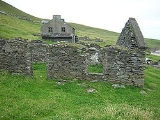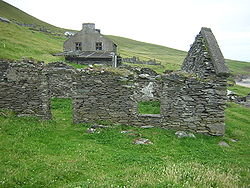
Muiris Ó Súilleabháin
Encyclopedia

Great Blasket Island
Great Blasket is the principal island of the Blaskets, County Kerry, Ireland.-Geography:The island lies approximately 2 km from the mainland at Dunmore Head, and extends 6 km to the southwest, rising to 292 metres at its highest point...
off the western coast of Ireland, Fiche Bliain ag Fás (Twenty Years a'Growing), published in Irish
Irish language
Irish , also known as Irish Gaelic, is a Goidelic language of the Indo-European language family, originating in Ireland and historically spoken by the Irish people. Irish is now spoken as a first language by a minority of Irish people, as well as being a second language of a larger proportion of...
and English in 1933. As one of the last areas of Ireland
Ireland
Ireland is an island to the northwest of continental Europe. It is the third-largest island in Europe and the twentieth-largest island on Earth...
in which the old Irish language and culture had continued unchanged, the Great Blasket Island was a place of enormous interest to those seeking traditional Irish narratives. Ó Súilleabháin was persuaded to write his memoirs by George Derwent Thomson, a linguist and professor of Greek who had come to the island to hear and learn the Irish language. Thomson edited and assembled the memoir, and arranged for its translation into English with the help of Moya Llewelyn Davies.
While Fiche Bliain ag Fás was received with tremendous enthusiasm by critics, including E.M. Forster, their praise at times had a condescending tone (Forster himself described the book as a document of a surviving "Neolithic" culture). Such interest was tied up with romantic notions of the Irish primitive, and thus when Ó Súilleabháin tried to find a publisher for his second book, Fiche Bliain faoi Bhláth (Twenty Years a-Flowering), there was little interest, as this narrative necessarily departed from the romantic realm of turf fires and pipe-smoking wise-women.
Ó Súilleabháin was drowned on 25 June, 1950, while swimming off the Connemara coast.

